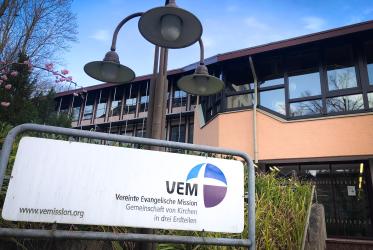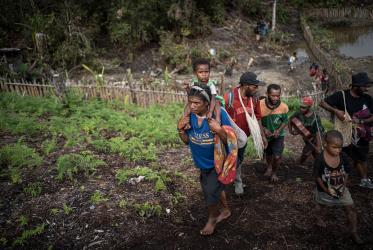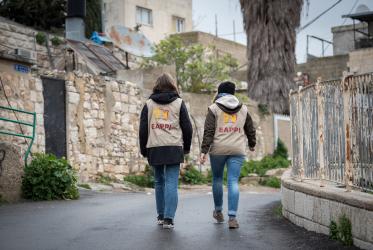Joint written statement submitted by non-governmental organizations* on the Roster
at the First Session of the Human Rights Council, June 2006
* Commission of the Churches on International Affairs of the World Council of Churches, Franciscans
International, International Association for Religious Freedom, and International Council of Women,
non-governmental organizations in general consultative status; All India Women's Conference,
Anglican Consultative Council, Baha'i International Community, Dominicans for Justice and Peace,
Interfaith International, International Association for Human Values, International Council of Jewish
Women, International Federation of Social Workers, International Federation of University Women,
International Fellowship of Reconciliation, International Humanist and Ethical Union, International
Network of Liberal Women, International Religious Liberty Association, Lutheran World Federation,
Pax Romana, Society for the Psychological Study of Social Issues, Susila Dharma International,
Unitarian Universalist Association, World Federation of Methodist and Uniting Church Women,
World Union of Catholic Women's Organizations, and World Young Women's Christian Association,
non-governmental organizations in special consultative status; and Institute for Planetary Synthesis,
International Association for Counselling, International Association of Gerontology, International
Catholic Society for Girls, and Soka Gakkai International.
As we approach the 25th anniversary of the Declaration on the Elimination of All
Forms of Intolerance and Discrimination Based on Religion or Belief, adopted by
the United Nations General Assembly on 25 November 1981, and the 20th
anniversary of the creation of the mandate on religious intolerance/freedom of
religion or belief, it is urgent to pay close attention to the conclusions and recommendations
in the latest report of the Special Rapporteur on freedom of religion
or belief, Ms Asma Jahangir (E/CN.4/2006/5); this could not be considered
sufficiently at the truncated 62nd session of the Commission on Human Rights.
It is to be hoped that the new Human Rights Council will quickly resolve structural
and procedural matters and give its early attention to substantive issues such
as are raised in the reports of special procedures.
Issues of protection remain of grave concern in many countries. There is need for
protection from denial or obstruction of the freedom to manifest one's religion or
belief as well as from the prohibition or punishment of the exercise of the freedom
to change one's own religion or belief. In a number of countries there have
been insensitive and provocative attempts to legislate against certain religious
symbols, including religious dress; in other countries there have been attempts
to legislate against or punish "conversions" without sufficiently differentiating
between "forced" and "free-will" conversion. There have been worldwide confusions
and even acts of violence over the failure to respect both the freedom of religion
and belief and the freedom of expression. It is necessary to protect convictions
based on religion or belief from defamation and offensive disrespect. It is
equally necessary to protect responsible use of freedom of expression from virulent
over-reactions.
Issues of prevention remain an important part of the mandate and vision of the
Special Rapporteur. NGOs which seek to mobilize and sensitize civil society often
feel frustrated that there has been little implementation of preventive measures
despite formal encouragements received from United Nations bodies. For example
recommendations from the "International Consultative Conference on School
Education in Relation with Freedom of Religion and Belief, Tolerance and Non-
Discrimination", held in Madrid in 2001, have not been sufficiently followed up
and resourced through fully staffed United Nations programmes or through support
for related NGO programmes. It is to be hoped that the United Nations
World Programme for Human Rights Education and the programmes for dialogue
among civilizations will bring new momentum to the task of education for
tolerance in the context of ignorance, prejudice and discrimination based on religion
or belief. One must also hope for more follow-up of the "Study on the Status
of Women in the light of Religions and Cultures" by Professor Abdelfattah Amor,
the former Special Rapporteur on freedom of religion or belief.
During the transition from Commission to Council, the recommendations that
followed in situ visits by several Special Rapporteurs, even when they drew urgent
attention to gross or life-threatening violations, have not been considered, much
less implemented. Furthermore, the reluctance of some governments to issue or
renew invitations for in situ visits is a continuing dilemma, as is the lack of mechanisms
to review and require implementation of recommendations. The Special
Rapporteur on freedom of religion or belief has urged increasing "involvement of
the relevant policy makers" and has stressed the need for "a mechanism to address
appropriately the situation of countries that consistently fail to cooperate with
the special procedures mechanisms". She has also encouraged governments and
NGOs to "support the initiatives that will be taken to organize events that will
take stock of achievements since 1981" and to "identify the provisions of the
Declaration that today raise particular concern and challenge rising trends of religious
intolerance".
The vision and determination shown by the Special Rapporteur on freedom of
religion or belief deserve the full support of governments and NGOs, and call for
adequate mechanisms of investigation, follow-up and, if necessary, enforcement.
The Special Rapporteur has shown by her methods of cooperation with other
Special Rapporteurs how inextricably connected with the freedom of religion or
belief are many other fundamental human rights. Similarly in the NGO community,
the NGOs which have signed this statement, many of which work together
regularly in the NGO Committee on Freedom of Religion or Belief (Geneva),
represent a spread of concerns extending beyond freedom of religion or belief to
the status of women, the right to education, the rights of the child, and many
other issues. However, freedom of religion or belief is a cross-cutting concern that
unites us all, as much as it divides many societies. Now, more than ever, the important
mandate of the Special Rapporteur on freedom of religion or belief deserves
the support of governments and civil society alike.





